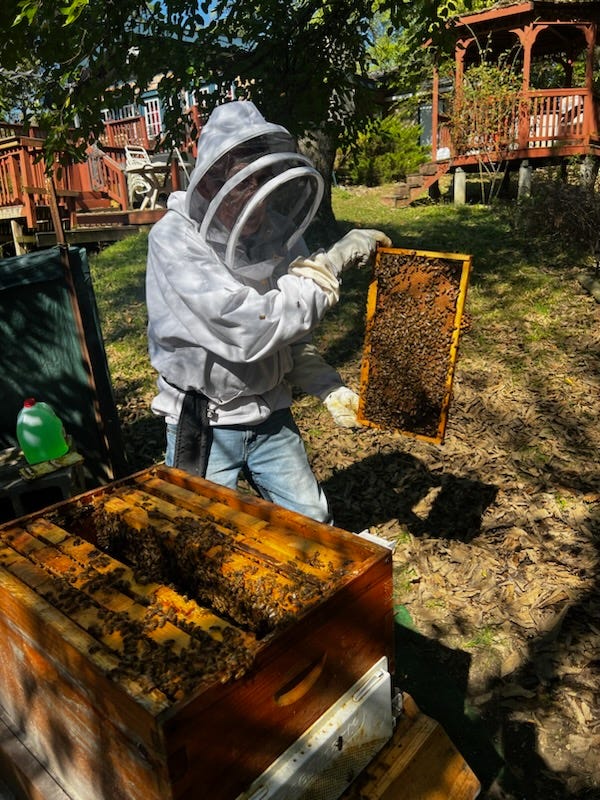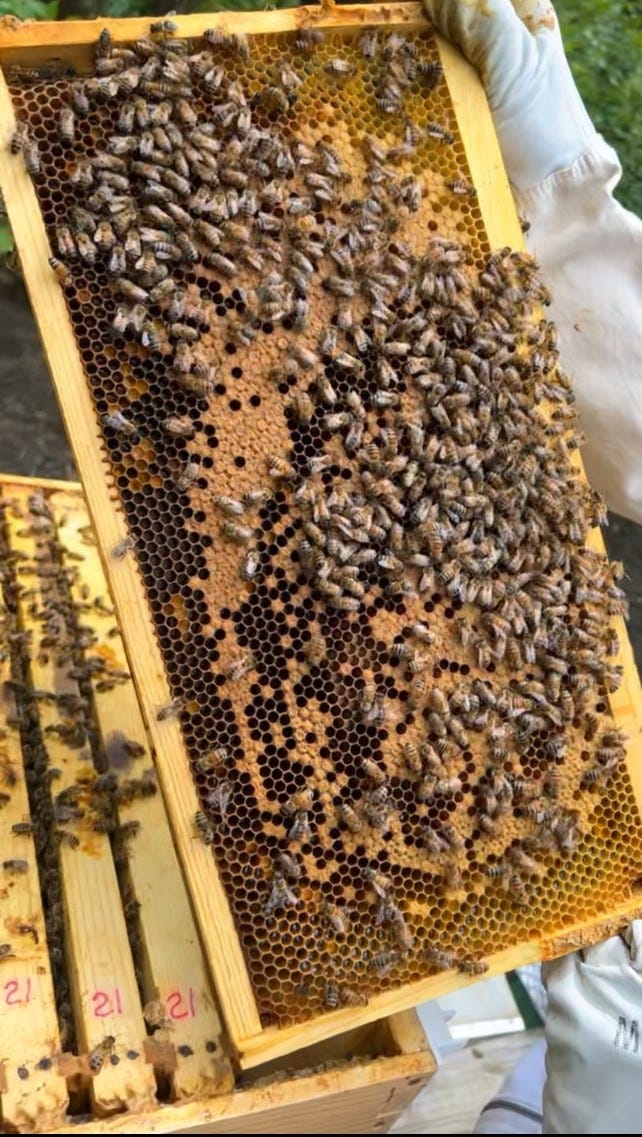
As a young child, I had a vivid dream that every inch of my body was covered by a loud sonorant buzz of busy bees. There was no harm, no stings-and when I awakened, there was a strong memory of relationship, peace and there was no fear. My tiny body was “the hive”, and the bees had bountiful messages for me.
It took decades to decipher the boundless brilliance of bees and what they were teaching me, and, I am still learning from them.
The bees taught me to enjoy the sweetness of life, bee a blessing, go where I need to go and pollinate a new world. They taught me to fly between the worlds, gather nectar, and share the gifts with others. Bee-ing One with nature teaches us truth and provides us with lasting nourishment, good and beauty. The significance of bees is ancient, shown by “prehistoric petroglyphs on various continents, created between 8,000 and 40,000 years ago.” The best teachers provide timeless blessings and our reciprocity is essential.
What can YOU do to make the world a better place? Have daily gratitude for the gifts of bees, know your relationship and responsibilities to give back to them and nature.
People can be good partners with nature. Allow nature to bee, and plant native flora that supports fauna. Reduce “green carpet lawns”, say no to damaging leaf blowers and return to natural landscapes without toxins- these are “behaviors” that reflect the teachings of the bees. Their “beehivior” teaches us to bee a part of the community and do your part to support a health-full, abundant world. Your reciprocity is needed to truly have sustainability, beauty, prosperity, health and peace.
Bee teaching: “enjoy the sweetness of life, bee a blessing”…
Observe nature to know that symbiotic relationships are evident. Bees, flowers and trees are an example of beneficent partnerships. Therefore, people who plant for pollinators, with no pesticides or other toxins, are responsible reciprocators. Nature was designed to care for itself. It is up to us to allow each species to do their part- their job- for the ecosystem to thrive. Truth works for all beings.
Bee teaching: “gather nectar, and share the gifts with others. Bee-ing One with nature teaches us truth and provides us with lasting nourishment, good and beauty.”
According to USGS, “About 1 billion pounds of conventional pesticides are used each year in the United States to control weeds, insects, and other pests.”
With farmland and habitats decreasing, developments increasing, and the usage of billions of pounds of pesticides, herbicides and insecticides, the bees need you to plant and support native, natural landscapes for them and for all of us. Chemicals in our air, water and soil can be cleansed and transformed by flora for all of our well-being.
Plant for pollinators and people- nature cleanses the air, soil and water.
Native flora and pollinators are essential for food production. Thirty five percent of our food comes from the work of the bees. Live with common sense- you are responsible for your partnership with nature. What we do to the bees, we do to ourselves.
May we give thanks for the bees and may the bees give thanks for us.
Bee teaching: “go where I need to go and pollinate a new world. They taught me to fly between the worlds”…
Quiet yourself, go within and ask, “what can I do to help the bees, people and their habitats?” Then, listen, take action and know truth- nature gives us our lives and is good for all of us. Nature gives us beauty, shelter, enjoyment, health, nourishment, kinship, a sense that we are part of something greater than ourselves, and it helps us Know Thyself.
Vote with your dollars.
How companies and people treat nature matters. Support is a choice. When we choose to purchase from those who do no harm, and choose to make a living doing no harm- we live in a powerful reciprocal way and we make a difference. We “fly between the worlds and ‘bee’ a blessing”. When a business, or anyone, recognizes sentience of non-humans, when compassion and empathy are integral in their business, they have my business and my “vote”.
People care about pollinators and nature.
May we give thanks for nature and may nature give thanks for us.
I recently attended a Pollinator Fest where I met some local bee-lievers in nature. People doing inspirational work for the pollinators are truths that must be told.
One man’s love for bees led him to advocate for pollinators and start a small business. One man uses his talents to build homes for pollinators - both help to educate the public on needs and give back to the community.
Keeper and Teacher of The Blessings of Bees
John Quast grew up working on his family’s farm in Denver, Colorado. After “retirement”, John moved to the Midwest to bee with family. He learned about the history of farming in the area, and about Lorenzo Langstroth, a local teacher, clergyman, and apiarist who lived in the 1800’s. Considered “the Father of American Beekeeping”, Langstroth was innovative. Among Langstroth’s many contributions to the beekeeping community, he invented the Langstroth hive and introduced the concept of bee space to commercial hive design.
A passionate friend of the bees, John helps create pollinator gardens with local youth groups, works with farmers, State and County agencies, and participates in community events. John is fascinated by the intelligence and beauty of bees and loves to share their message. He teaches others about how bees communicate, work together, how they move within the hive, and how they flap their wings to regulate the temperature of the hive. They work with what nature provides, will fly several miles to pollinate, gather nectar, and do their job for the community. (“go where you need to go to pollinate a new world”)
The message of the bees that John exhibits and shares is the importance to work for the good of their community, like the bees. No bee works for itself- each bee works for the needs of the community. To allay people’s fears, it is important to know that bees do not sting unless they are threatened. They release a pheromone to signal danger. He reminds people that we are more of a threat to the bees and their habitats than they are to us.
John’s work to share the message that the bees need healthy habitats and clean water for drinking and cooling the nest. He provides shallow basins of water with rocks and sticks and doesn’t use chemicals.
He teaches people how to bee good stewards, plant their own pollinator gardens, whether in pots or in the ground, and teaches people to ask “is it pollinator friendly?” The impact of pesticides is immense and it is important to maintain plants and trees organically. He states, “If people were more like the bees, the world would bee a better place.”

John read nearly three dozen books about bees, observed and learned from the bees for five years before working with them. Local libraries, government agencies, non-profits and three professional associations know and love John. His passion grew to his neighbor, Jacob, with whom he shares his knowledge. Together, they own J & J Apiaries in Hamilton, Ohio. Their partnership is the teamwork of the bees: work for the good of the community. John, Jacob and the bees are thriving, and so is their business. They win competitions at the Butler County Fair, and sell out of their products at events: honey infused with peppers and raw honey. Soon more infused honey products will be available. Vote with your dollars and support their compassionate work within the community. Contact John and Jacob at J&J Apiaries in Hamilton, Ohio at (513) 206-0324, Jquast2979@gmail.com.

John is a member of: Butler County Beekeeper Association, SW Ohio Beekeepers, and Ohio State Beekeepers Association.
Stevens Wood Shop
Another way to support bees is by providing a house for solitary bees from Stevens Wood Shop. Steven also makes bat houses, bird houses, and helps educate the public about the importance of pollinators. Every item is personally crafted by Steven Webster, a young business owner with cognitive disabilities who has a passion for woodworking.
Stevens Wood Shop allows Steven to work toward becoming self-sufficient and enables him to give back to the community while doing something he loves and demonstrates that successful entrepreneurship is attainable for anyone.
You can also find Steven on Facebook and Etsy.
What YOU can do to BEE a good steward for pollinators:
Bee responsible. Understand your relationship and responsibility to others. Please use natural products to protect and conserve our air, soil and water.
Plant native trees and wildflowers: How you can help bees.
Attend local pollinator festivals: Learn about the local groups, Universities, agencies and organizations who provide information and have opportunities for volunteering or employment. Many provide free seeds to encourage people to be good stewards and grow plants for pollinators.
Buy local natural products and food from small farmers and farmer’s markets who use regenerative, non-toxic care for nature and all bee-ings- they give back to their community with service.
Support organizations who support nature and people: Organic Consumers Association.
Visit Xerces: “While different bees may have specific needs to support each stage of their lifecycle, they all need high-quality habitat that provides an abundance of flowers, shelter and nesting sites, and protection from pesticides.”
Support the work of Beyond Pesticides
Support and keep reading goodness on Wildlands! The mission of Wildlands is to share truth through art, poetry and story-telling so that the sentience of nature is known, to reconnect people with nature, and evolve support of the rights of nature. Healing the lands and waters, heals people. Please make a pledge today to support Wildlands.
May we Be grateful, and Be a blessing for the bees, water, air and land, and may nature continue to be grateful for us.






I am pleased to report that this essay has people buzzing about creative writing and love of bees! ❤️🐝🐝🐝💕 May the bees thrive! RIP to all lost to hurricanes. Thank you for your service and may they all bee with Something Greater than Ourselves. ✨️🎇🎆💕💞💕
From another reader/ paid subscriber of https://robinmotzer.substack.com : "I really want to support you because I am a beekeeper and work to promote planting to benefit all pollinators." -John